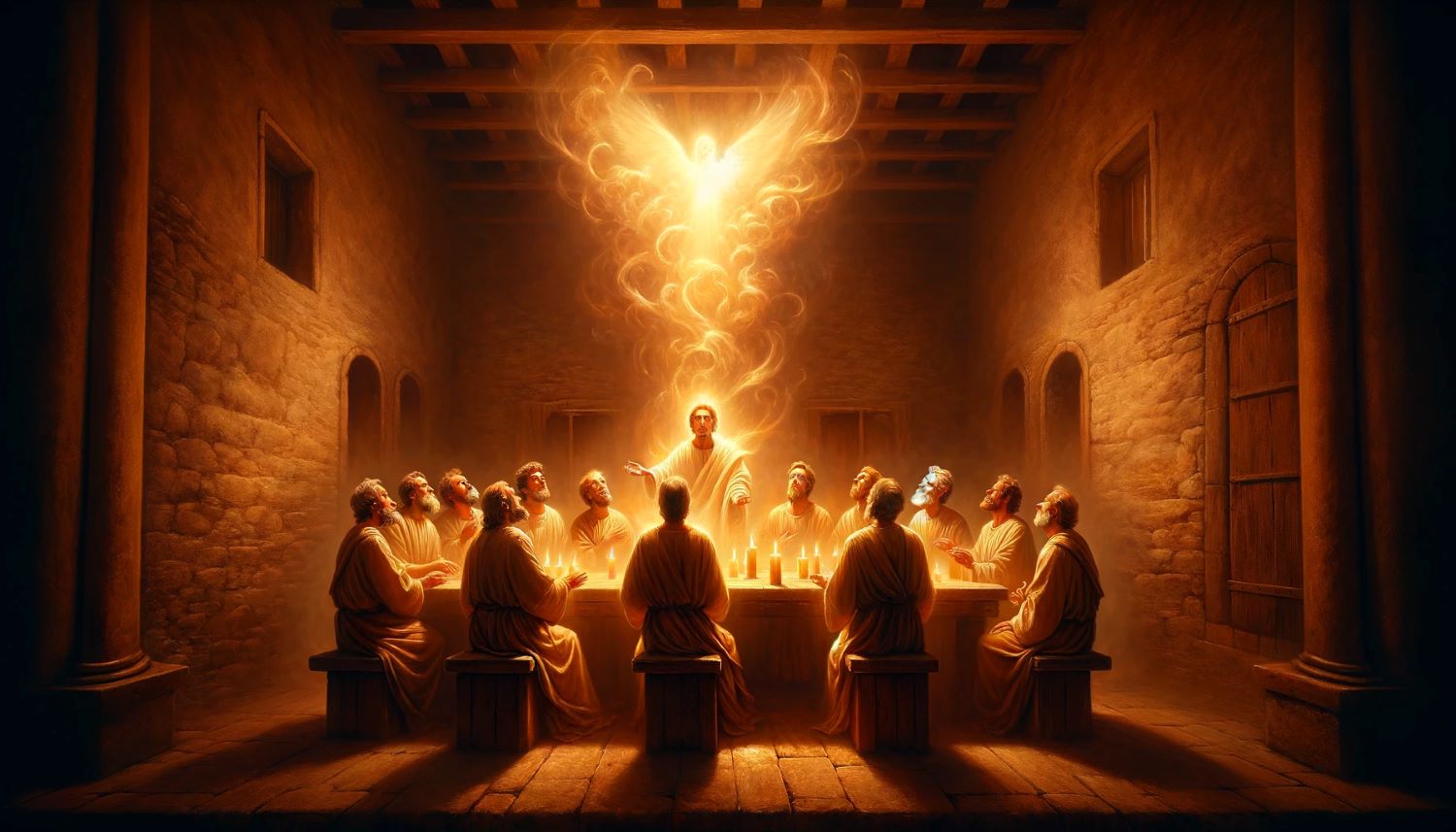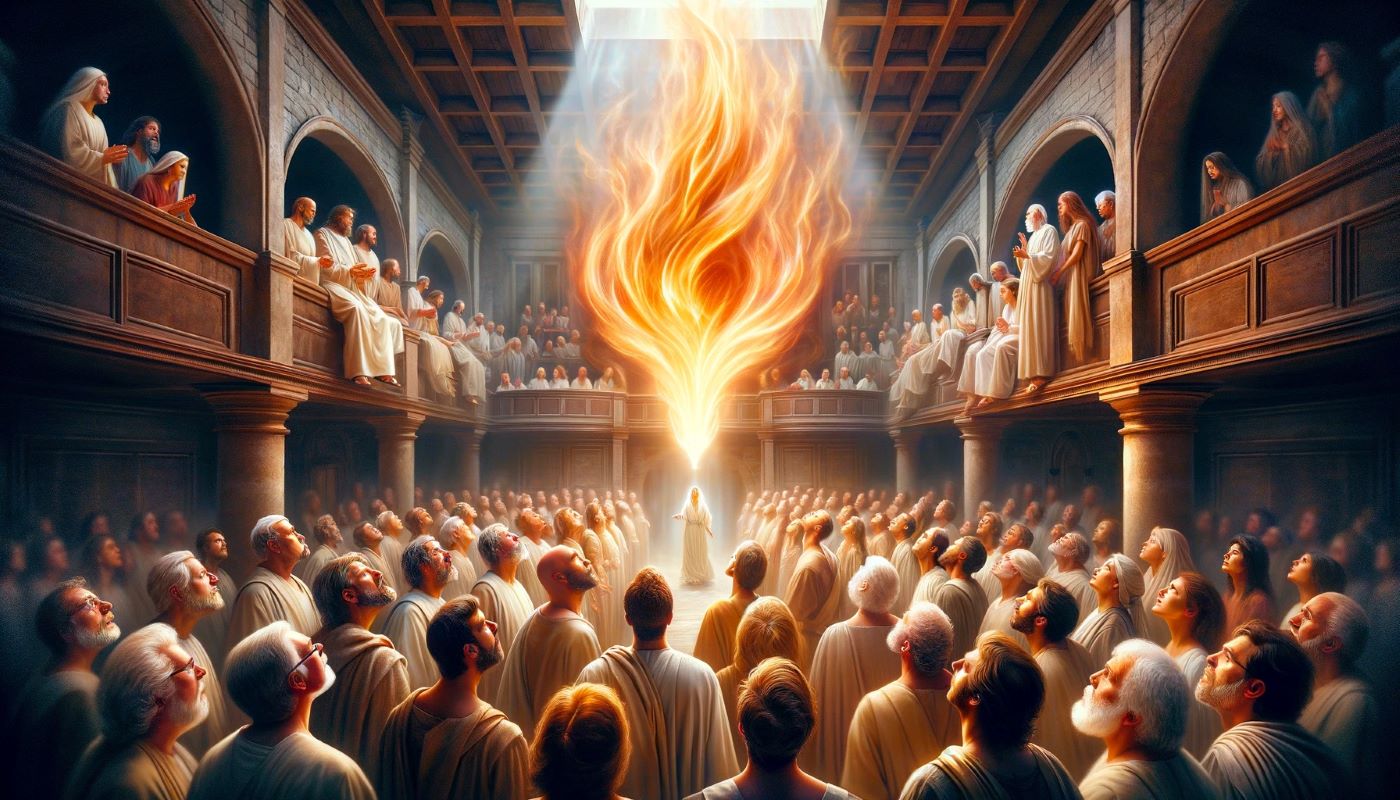Home>Bible Facts>What Day Did The Holy Spirit Come To The Apostles


Bible Facts
What Day Did The Holy Spirit Come To The Apostles
Published: February 22, 2024
Jason DeRose, Managing Editor at Christian.net, uses his expertise in religion and journalism to deepen understanding of faith's societal impacts. His editorial leadership, coupled with a strong academic background, enriches the platform’s diverse content, earning him recognition in both journalism and religious circles.
Discover the biblical facts about the day the Holy Spirit came to the apostles and the significance of this pivotal event in Christian history. Explore the scriptural account and its impact on the early church.
(Many of the links in this article redirect to a specific reviewed product. Your purchase of these products through affiliate links helps to generate commission for Christian.net, at no extra cost. Learn more)
Table of Contents
Introduction
The arrival of the Holy Spirit to the apostles is a pivotal event in Christian history, marking the fulfillment of Jesus Christ's promise to send a divine helper and advocate. This extraordinary occurrence, known as the Day of Pentecost, holds immense significance in the establishment of the early Christian church and the empowerment of the apostles to spread the teachings of Jesus Christ.
The account of the Holy Spirit's descent upon the apostles is chronicled in the New Testament, specifically in the book of Acts. This momentous event not only symbolizes the divine fulfillment of prophecy but also serves as a catalyst for the transformation of the apostles from fearful and uncertain individuals into bold and unwavering messengers of the Gospel.
The narrative of the Holy Spirit's arrival is steeped in profound spiritual and theological implications, underscoring the divine connection between God and humanity. Understanding the circumstances and implications of this event provides invaluable insight into the foundational beliefs and practices of the Christian faith.
As we delve into the details of the Day of Pentecost and the descent of the Holy Spirit, we embark on a journey to unravel the profound impact of this extraordinary occurrence on the apostles and the early Christian community. This exploration will illuminate the transformative power of the Holy Spirit and its enduring significance in shaping the course of Christian history and belief.
The subsequent sections will delve deeper into the historical and spiritual dimensions of this momentous event, shedding light on the experiences of the apostles, the profound impact of the Holy Spirit's arrival, and the enduring legacy of this pivotal juncture in the early Christian movement.
The Day of Pentecost
The Day of Pentecost, also known as the Feast of Weeks, holds significant importance in both Jewish and Christian traditions. It falls fifty days after the Passover, commemorating the giving of the Torah at Mount Sinai and the harvest festival in Jewish tradition. In the Christian context, the Day of Pentecost marks the outpouring of the Holy Spirit upon the apostles and the birth of the early Christian church.
The events of the Day of Pentecost are vividly described in the New Testament, in the book of Acts, chapter 2. The apostles had gathered in Jerusalem following the ascension of Jesus Christ, as instructed by him. Suddenly, a sound like a mighty rushing wind filled the house where they were sitting. Tongues of fire appeared and rested on each of them, and they were filled with the Holy Spirit.
The significance of the timing of this event cannot be overstated. The city of Jerusalem was teeming with people from various regions who had come to celebrate the feast. As the apostles were filled with the Holy Spirit, they began to speak in different languages, attracting the attention of the crowd. This miraculous display of multilingual communication astounded the onlookers, who were bewildered by the fact that they could hear the apostles speaking in their native tongues.
Peter, one of the prominent apostles, seized the opportunity to address the crowd and explained that what they were witnessing was the fulfillment of the prophecy of Joel, wherein God promised to pour out His Spirit on all flesh. He boldly proclaimed the message of Jesus Christ, emphasizing his crucifixion, resurrection, and exaltation as Lord and Savior.
The Day of Pentecost thus represents a profound convergence of divine timing and purpose. The outpouring of the Holy Spirit empowered the apostles to boldly proclaim the Gospel, leading to the conversion of about three thousand people on that day. This pivotal event laid the foundation for the early Christian church, marking the beginning of a movement that would ultimately spread across the known world.
The Day of Pentecost stands as a testament to the divine orchestration of history and the transformative power of the Holy Spirit. It serves as a cornerstone of Christian belief, highlighting the fulfillment of Jesus Christ's promise to send a helper and advocate to guide and empower his followers. This extraordinary day continues to be celebrated in Christian tradition, serving as a reminder of the enduring impact of the Holy Spirit's arrival on the apostles and the birth of the Christian church.
The Descent of the Holy Spirit
The Descent of the Holy Spirit, as depicted in the New Testament's book of Acts, is a profoundly significant event that symbolizes the fulfillment of Jesus Christ's promise to send the Holy Spirit to his disciples. This pivotal moment occurred on the Day of Pentecost, a time when devout Jews from various regions had gathered in Jerusalem to celebrate the feast. The account of the Descent of the Holy Spirit unfolds with dramatic and awe-inspiring imagery, underscoring the divine nature of this extraordinary occurrence.
The narrative describes how the apostles were gathered in a house when suddenly, a sound like a mighty rushing wind filled the space. This auditory manifestation was accompanied by the appearance of tongues of fire that rested on each of the apostles. These powerful and symbolic manifestations signaled the arrival of the Holy Spirit, marking the beginning of a transformative and spiritually charged experience for the apostles.
The descent of the Holy Spirit was not merely a symbolic or ethereal occurrence; it was a tangible and transformative event that imbued the apostles with divine empowerment and guidance. The filling of the Holy Spirit enabled the apostles to speak in different languages, a miraculous display that captivated the attention of the diverse crowd gathered in Jerusalem. This multilingual phenomenon served as a compelling sign of the Holy Spirit's presence and power, drawing the bewildered onlookers to witness this extraordinary manifestation.
The apostle Peter, emboldened by the presence of the Holy Spirit, seized the opportunity to address the crowd and elucidate the significance of the moment. His impassioned and Spirit-inspired speech resonated with the listeners, leading to the conversion of thousands of individuals who were deeply moved by the message of Jesus Christ. This pivotal moment not only marked the fulfillment of divine prophecy but also signaled the dawn of a new era in the proclamation of the Gospel.
The Descent of the Holy Spirit stands as a testament to the divine intervention and the profound connection between God and humanity. This extraordinary event serves as a cornerstone of Christian belief, underscoring the transformative power of the Holy Spirit in equipping and emboldening the apostles to fulfill their mission. The Descent of the Holy Spirit continues to inspire and resonate within Christian tradition, serving as a timeless reminder of the enduring impact of this extraordinary divine manifestation.
This momentous event not only transformed the apostles but also laid the foundation for the early Christian church, setting in motion a movement that would ultimately shape the course of history and profoundly impact the lives of countless individuals across the ages. The Descent of the Holy Spirit remains a testament to the enduring presence and influence of the Holy Spirit in the lives of believers, underscoring the timeless relevance and significance of this extraordinary event.
The Apostles' Experience
The apostles' experience of the Holy Spirit's descent on the Day of Pentecost was nothing short of extraordinary. As they gathered in Jerusalem, they were filled with anticipation and uncertainty, grappling with the profound impact of Jesus Christ's departure and the weight of the mission entrusted to them. However, the events that unfolded on that momentous day would forever alter their lives and embolden them to fulfill their divine calling.
The apostles' encounter with the Holy Spirit was marked by profound manifestations that transcended the realm of the ordinary. The sound of a mighty rushing wind filled the house, signaling the imminent arrival of the Holy Spirit. This auditory phenomenon was accompanied by the appearance of tongues of fire that rested on each of the apostles, symbolizing the divine presence and empowerment bestowed upon them.
The filling of the Holy Spirit ignited a transformative experience within the apostles, infusing them with courage, clarity of purpose, and a profound sense of spiritual empowerment. They were endowed with the ability to speak in different languages, a miraculous manifestation that astounded both the apostles themselves and the diverse crowd gathered in Jerusalem.
The apostle Peter, in particular, underwent a remarkable transformation as he addressed the crowd with unwavering conviction and eloquence, boldly proclaiming the message of Jesus Christ. His impassioned speech, inspired by the Holy Spirit, resonated deeply with the listeners, leading to the conversion of thousands of individuals who were moved by the profound truth and power of the Gospel.
The apostles' experience of the Holy Spirit's descent was a watershed moment that catalyzed a profound shift in their demeanor, resolve, and mission. They were no longer the hesitant and apprehensive individuals who had grappled with doubt and fear following Jesus' crucifixion. Instead, they emerged as bold and resolute messengers of the Gospel, driven by an unwavering commitment to fulfill the mandate entrusted to them by Jesus Christ.
The apostles' experience of the Holy Spirit's arrival stands as a testament to the transformative and empowering nature of this extraordinary event. It imbued them with the spiritual fortitude and conviction to embark on their mission of spreading the teachings of Jesus Christ, ultimately laying the foundation for the early Christian church and the enduring legacy of the Christian faith.
This pivotal experience serves as a timeless reminder of the profound impact of the Holy Spirit's arrival on the apostles, underscoring the enduring significance of this extraordinary divine manifestation in shaping the course of Christian history and belief.
The Impact of the Holy Spirit's Arrival
The arrival of the Holy Spirit on the Day of Pentecost had a profound and far-reaching impact on the apostles and the early Christian community. This extraordinary event served as a catalyst for transformative change, empowering the apostles to fulfill their mission and laying the groundwork for the burgeoning Christian movement.
The infusion of the Holy Spirit imbued the apostles with a newfound sense of courage, conviction, and spiritual empowerment. They were transformed from hesitant and uncertain individuals into bold and resolute messengers of the Gospel, undeterred by the challenges and opposition they encountered. The Holy Spirit's arrival instilled within them a deep sense of purpose and an unwavering commitment to proclaim the message of Jesus Christ, regardless of the obstacles they faced.
Furthermore, the multilingual manifestation of the Holy Spirit's presence served as a compelling sign to the diverse crowd gathered in Jerusalem. This miraculous display not only captured the attention of the onlookers but also facilitated the effective communication of the Gospel to individuals from various regions and linguistic backgrounds. The apostles' ability to speak in different languages, inspired by the Holy Spirit, transcended cultural and linguistic barriers, enabling them to convey the message of Jesus Christ with clarity and impact.
The impact of the Holy Spirit's arrival extended beyond the immediate events of the Day of Pentecost. It laid the foundation for the early Christian church, fostering a sense of unity, purpose, and communal devotion among the believers. The outpouring of the Holy Spirit catalyzed a wave of conversions, leading to the formation of a vibrant and dynamic Christian community characterized by mutual support, spiritual fervor, and a shared commitment to the teachings of Jesus Christ.
Moreover, the Holy Spirit's arrival equipped the apostles with spiritual gifts and abilities essential for the advancement of the Gospel. These gifts, including wisdom, knowledge, faith, healing, and the ability to perform miracles, empowered the apostles to minister to the needs of the burgeoning Christian community and effectively demonstrate the transformative power of the Gospel.
The enduring impact of the Holy Spirit's arrival reverberates throughout the annals of Christian history, underscoring the timeless relevance and significance of this extraordinary event. It stands as a testament to the transformative power of divine intervention and the enduring influence of the Holy Spirit in equipping and emboldening believers to fulfill their calling and advance the Kingdom of God.
This pivotal moment continues to inspire and resonate within Christian tradition, serving as a timeless reminder of the enduring impact of the Holy Spirit's arrival on the apostles and the birth of the Christian church.
Read more: How Did The Holy Spirit Help The Apostles
Conclusion
The descent of the Holy Spirit upon the apostles on the Day of Pentecost stands as a watershed moment in Christian history, marking the fulfillment of Jesus Christ's promise to send a divine helper and advocate. This extraordinary event, vividly chronicled in the New Testament's book of Acts, serves as a testament to the transformative power of the Holy Spirit and its enduring impact on the apostles and the early Christian community.
The Day of Pentecost, with its dramatic manifestations of a rushing wind and tongues of fire, symbolized the divine outpouring of the Holy Spirit upon the apostles. This pivotal event empowered the apostles to boldly proclaim the Gospel, leading to the conversion of thousands and laying the foundation for the early Christian church. The multilingual manifestation of the Holy Spirit's presence facilitated effective communication of the Gospel to individuals from diverse linguistic backgrounds, transcending cultural barriers and fostering a sense of unity and communal devotion among the believers.
The apostles' experience of the Holy Spirit's arrival was nothing short of extraordinary, transforming them from hesitant and uncertain individuals into bold and resolute messengers of the Gospel. The infusion of the Holy Spirit imbued them with courage, conviction, and spiritual empowerment, equipping them with the gifts and abilities essential for the advancement of the Gospel and the demonstration of God's transformative power.
The enduring impact of the Holy Spirit's arrival reverberates throughout the annals of Christian history, underscoring the timeless relevance and significance of this extraordinary event. It continues to inspire and resonate within Christian tradition, serving as a timeless reminder of the enduring impact of the Holy Spirit's arrival on the apostles and the birth of the Christian church.
The Day of Pentecost and the descent of the Holy Spirit remain foundational elements of Christian belief, symbolizing the divine connection between God and humanity and the transformative power of faith. This extraordinary event serves as a testament to the enduring presence and influence of the Holy Spirit in the lives of believers, underscoring the timeless relevance and significance of this pivotal juncture in the early Christian movement.
In conclusion, the Day of Pentecost and the descent of the Holy Spirit stand as a testament to the transformative power of divine intervention and the enduring influence of the Holy Spirit in equipping and emboldening believers to fulfill their calling and advance the Kingdom of God. This extraordinary event continues to inspire and resonate within Christian tradition, serving as a timeless reminder of the enduring impact of the Holy Spirit's arrival on the apostles and the birth of the Christian church.














